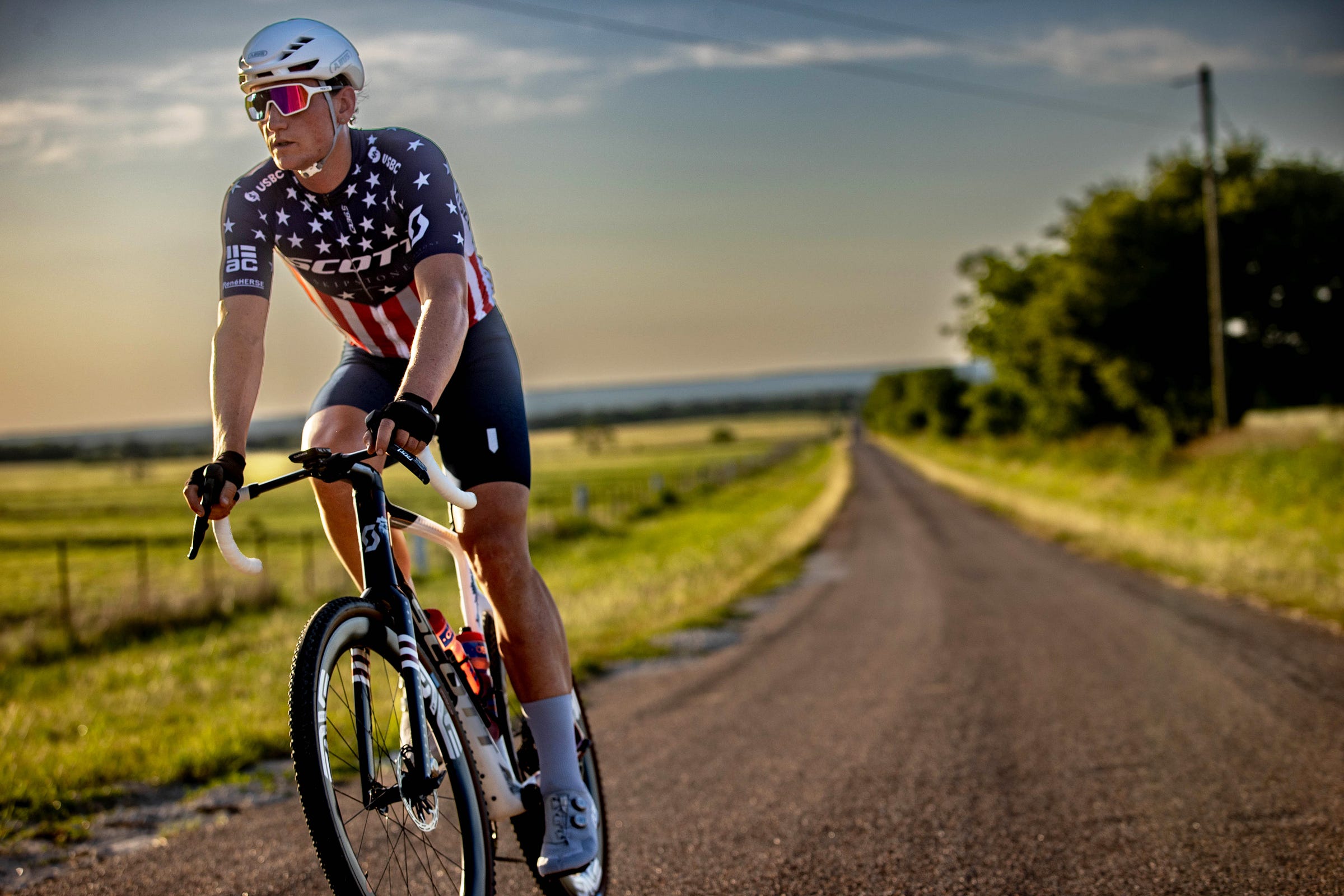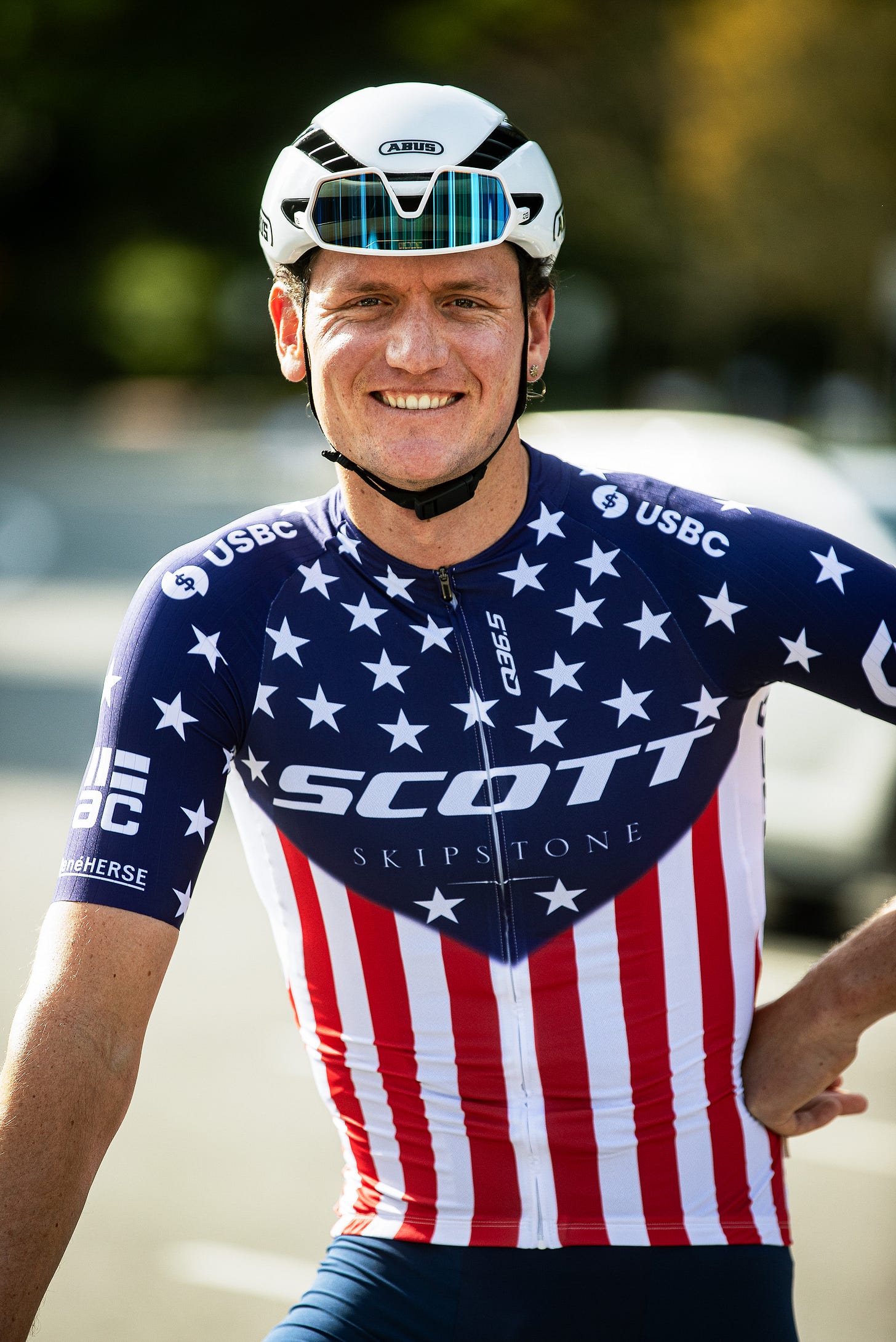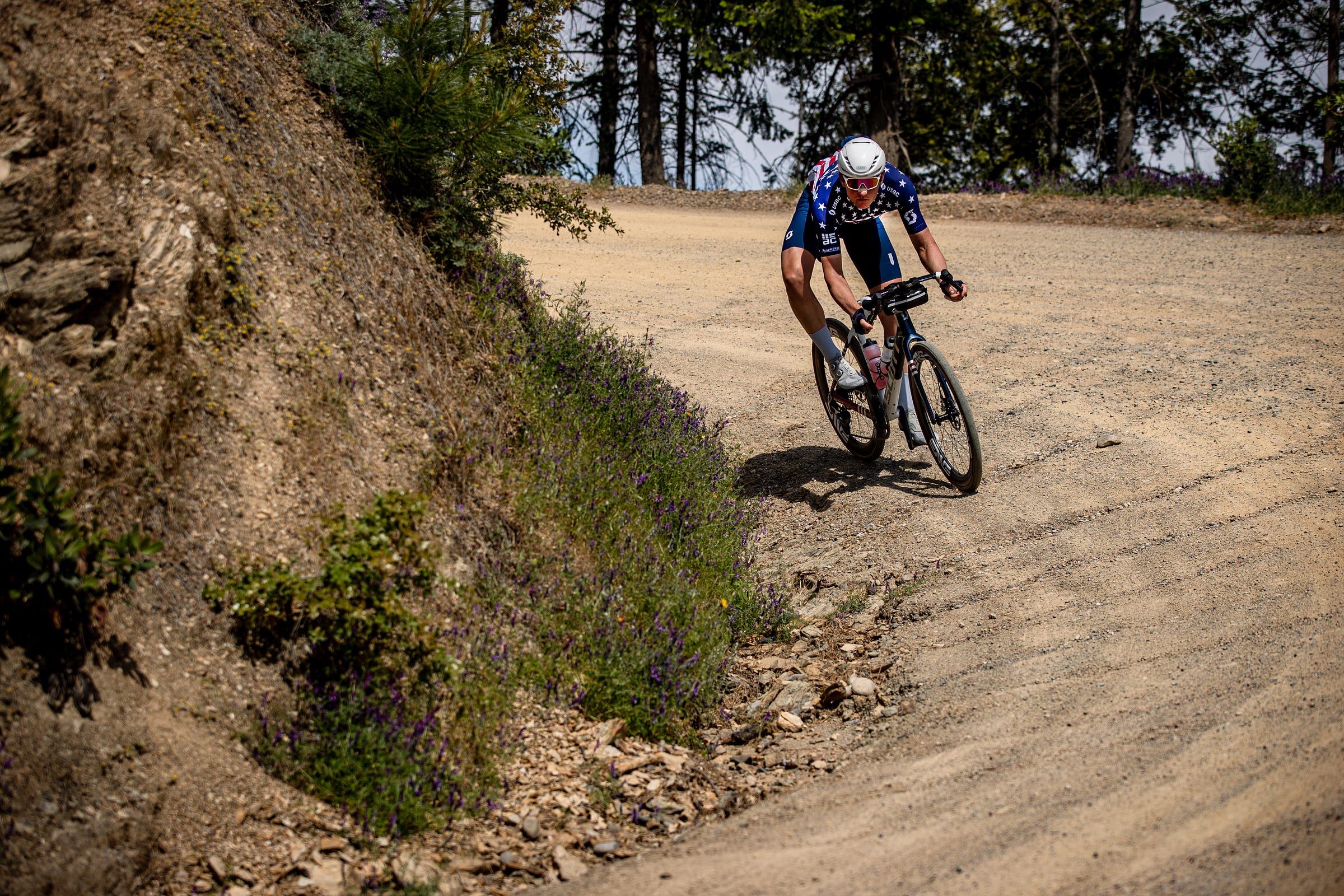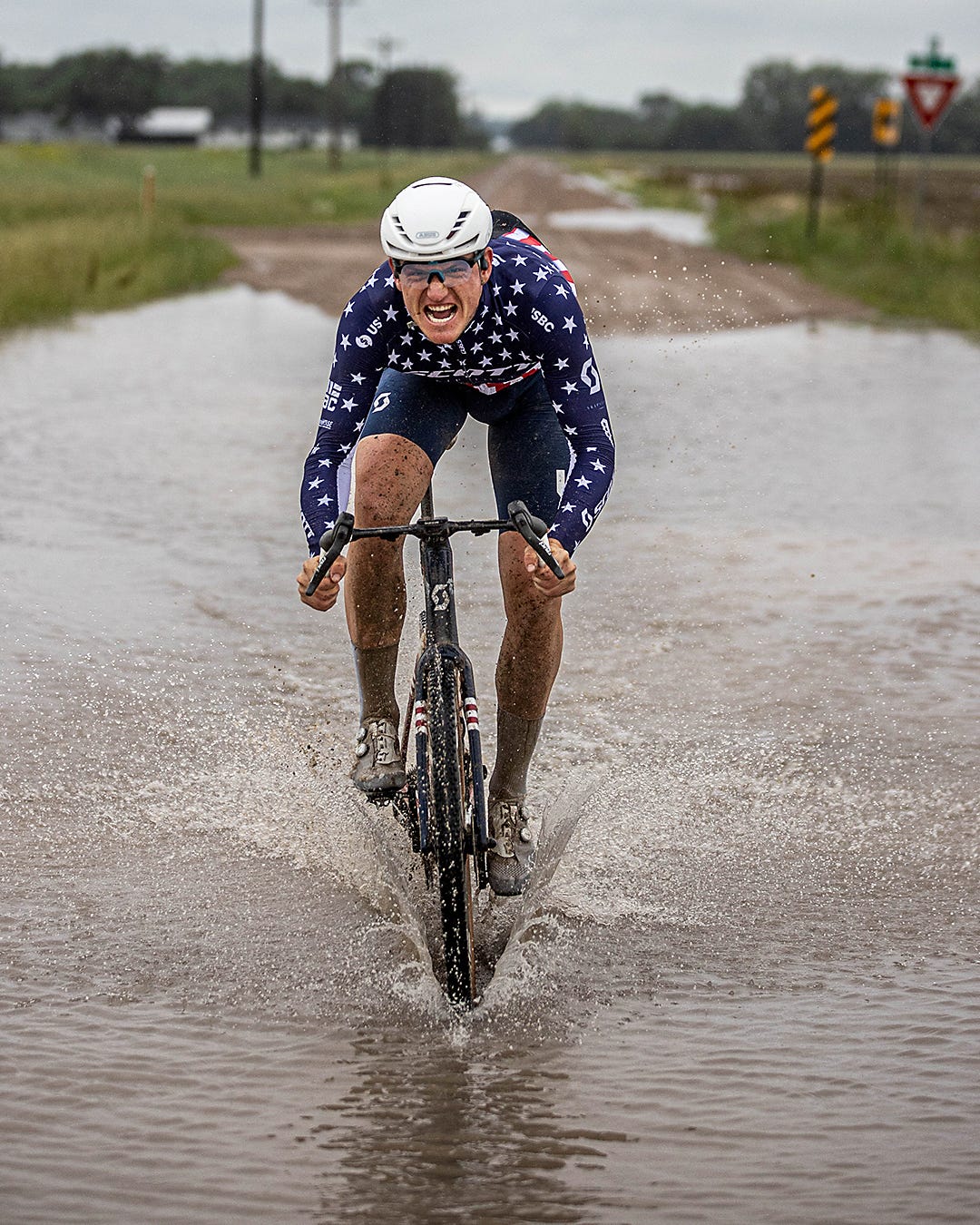USBC athlete Brennan Wertz takes on the world
On Saturday, the U.S. champ competes in the world’s most prestigious gravel race

Reigning U.S. national gravel champion and USBC sponsored athlete Brennan Wertz will be competing at Unbound Gravel this Saturday in Emporia, Kansas, widely considered the world’s most prestigious gravel race.
“Unbound is a big goal,” Brennan told me in the weeks leading up to the race. “I would say my two biggest goals for this year would be to win Unbound in the Stars and Stripes Jersey and to defend Nationals at the end of September.”
Much like how the Tour de France has different jerseys to signify certain achievements—such as yellow for the overall leader or polka dot to designate the so-called King of the Mountains—there are also year-round jersey classifications.
As the current champion, Brennan will be donning red, white, and blue to represent the U.S.
“That’s a big, big honor. It’s pretty surreal.”
A late bloomer
Brennan’s journey to the top of the American gravel summit is hardly traditional—in fact, he’s a bit of a late bloomer when it comes to cycling.
Growing up in Mill Valley, California, his family didn’t have a TV. Instead, they emphasized outdoor hobbies like hiking, backpacking, or just playing in the woods.
“I grew up mountain biking with my family, riding a bit on Mount Tam, but never racing, never participating in anything competitive at all. It was just a fun outlet to hang out with my friends.”
In the meantime, he would focus his competitive energy on rowing throughout high school. “I did a year of basketball, two years of baseball, but it just never really clicked for me. I found my passion in outdoor adventure and endurance sports.”
He would later be recruited by Stanford and found himself training with the national team during the summers.
“My last rowing competition—or, really, my last time ever rowing—was in 2018 at the World Championships in Poland, where we won Worlds in the U23 category.”
As is sometimes the case with elite athletes, injury would change the trajectory of Brennan’s career.
“It was a stress fracture of the ribs—and the separating of the ribs from the intercostal muscles. Everything was strained and inflamed—my whole rib cage was in a ton of pain. I couldn’t sleep. It was hard to breathe. I was scared to sneeze or cough.”
That’s when he turned to cycling. Really, he was just looking to have some fun again.
“In the last year or two of rowing, the injuries started to accumulate, and as that worsened, I spent more time cross-training on the bike. Ultimately, I came to the conclusion that my cross-training was more fun than my actual training.”
“It occurred to me, maybe I should have a think about what it is that I want to be doing.”
Blessed with an engine incrementally and arduously built from years of competitive rowing, Brennan’s transition to cycling was relatively smooth.
“The musculature and fitness required for cycling are quite similar to rowing. The biggest difference is bike handling.”
The rise of gravel
From 2018 to 2019, Brennan started racing road bikes, and was feeling optimistic about his cycling future. For 2020, he had an entire season planned, but of course, that’s when COVID struck. To pass the time, he built a gravel bike.
“It opened my eyes to this whole other world of riding that I really enjoyed. And coming out of the pandemic, the gravel races were the first ones to start up again. I just really enjoyed them so I started doing more and got some good results straight away. From there, well, the rest is history. It became kind of a snowball effect as I qualified for more races and got more results. The answer was right there. I left my job and focused full time on gravel racing.”
Within cycling, gravel is more of an emerging niche.
“I was definitely in the right place at the right time. It was a fortuitous time for me to come into it, but it wasn’t a complete accident. I was starting to connect the dots already back in 2016 when I did an internship at this PR marketing agency that had a lot of bike industry clients based all over Germany.”
“There was all this talk about bikepacking and gravel bikes, and I was like, what is this? Around that time, a gravel race in Kansas also caught my attention—it was 200 miles and totally crazy. So that summer, I ended up exploring much of Central Europe on my mountain bike, did a lot of bikepacking, in awe of this vast network of terrain. That’s kind of when it clicked for me. This gravel thing was real. It’s not just a little thing in rural Kansas, there’s insane gravel terrain all across Europe and the rest of the world.”
“Not only that, there’s this burgeoning industry that’s starting to create equipment perfectly suited for this type of riding, opening up an entire new world of cycling. It’s not great on a mountain bike. It’s not really great on a road bike, either. You need this in-between sort of bike, and boom, this whole thing just went crazy. The pandemic helped fuel it. Gravel has taken off since then.”
If road racing is Formula 1, gravel is more like World Rally Car. One’s purely about speed, the other is about becoming one with the trail.
“There’s different skillsets required in each. At its core, gravel is about understanding the terrain, being comfortable sliding in the dirt and losing traction.”
Becoming champion
When you picture a world class cyclist, you’d likely imagine someone incredibly lean, not too lanky. Particularly when it comes to some of the more brutal climbs, everything is about your power to weight ratio.
“It’s just a certain element of physics.”
At 6’5” and 200 lbs., Brennan is not your typical world class cyclist.
“It’s definitely something I’m acutely aware of. There’s plenty of courses where I’m realistic enough with myself to know that I’ll never win. But there are all these other races that are better suited for my build and skillset.”
“On courses like Nationals last year I was really able to use that to my advantage. In rolling terrain, I have an advantage against these lighter, all-rounder type guys. Because of my mass, I can efficiently carry so much more momentum.”
But that’s not the reason why he won. Rather, it came down to carefully crafted strategy—and part of the reason why Brennan loves this sport as much as he does.
“That’s something about this sport that I really enjoy, the cerebral nature of it. You have to be mentally locked in. The strongest person does win sometimes, but it’s not always the case. My win at Nationals was a perfect example of that because I was far from the strongest on paper that day, but due to some savvy racing and smart tactical choices, I was able to get it done.”
Not only was Brennan not the strongest racer, disaster struck during the buildup to the race.
“A month out, I was in Boulder for a training camp preparing for this race called Steamboat Gravel, which is at altitude. I ended up getting COVID—that was a big, big blow. It meant I would miss an entire block of races in the leadup to Nationals.”
“It also took me a really long time to bounce back—I don’t know if I had some sort of long COVID or something. I was hardly training. The longest ride I did in that time was three and a half hours and Nationals is a six hour race.”
“I wasn’t prepared, and I was still dealing with some lingering long COVID symptoms. It wasn’t ideal, but between my coach and I, we felt like there wasn’t any harm in racing. This had been such a big target for us that we had to at least make the trip out there and see how it would go.”
“I decided to take a really risky setup with my bike—to fully optimize for the very final stint of the race since the last two kilometers were on pavement. With the rest of the course on gravel, most of the guys in the race opted for mountain bike tires. I went with narrow slicks instead, which would give me a big advantage in the final sprint and lean into my strengths. It was a roll of the dice, but if I could keep up with the pack, then I would have a chance.”
“That’s pretty much how the race went. I felt terrible the whole day, really suffering, but every time I got dropped, I was able to slowly claw my way back to the group. In the end, it came down to the final two kilometers and I was able to come away with the win. It was a big, big relief, a big honor.”
“Honestly, it was a turning point for me in professional cycling. I had been having a tough year. I wasn’t feeling great in races and then this COVID thing happened. I had started to feel incredibly frustrated—with my training, my races, my results. For it to come together in such an unexpected way, it really revitalized my spirit and my career.”
“It’s my biggest result and one that I’m extremely proud of.”







